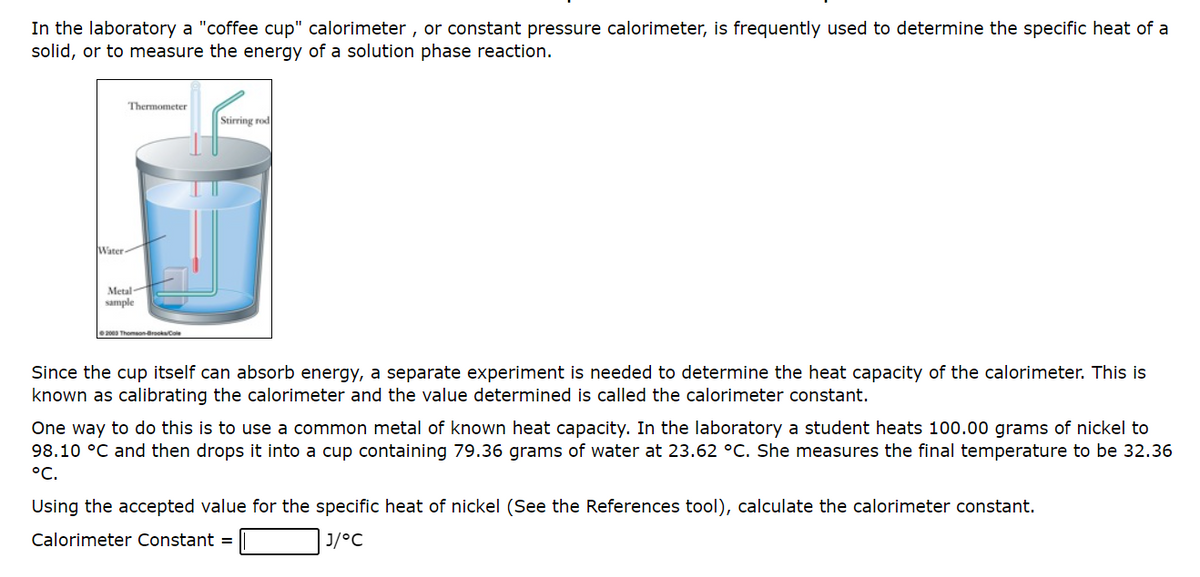In the laboratory a "coffee cup" calorimeter, or constant pressure calorimeter, is frequently used to determine the specific heat of a solid, or to measure the energy of a solution phase reaction. Water Thermometer Metal sample Stirring rod Since the cup itself can absorb energy, a separate experiment is needed to determine the heat capacity of the calorimeter. This is known as calibrating the calorimeter and the value determined is called the calorimeter constant. One way to do this is to use a common metal of known heat capacity. In the laboratory a student heats 100.00 grams of nickel to 98.10 °C and then drops it into a cup containing 79.36 grams of water at 23.62 °C. She measures the final temperature to be 32.36 °C. Using the accepted value for the specific heat of nickel (See the References tool), calculate the calorimeter constant. Calorimeter Constant = J/°C
In the laboratory a "coffee cup" calorimeter, or constant pressure calorimeter, is frequently used to determine the specific heat of a solid, or to measure the energy of a solution phase reaction. Water Thermometer Metal sample Stirring rod Since the cup itself can absorb energy, a separate experiment is needed to determine the heat capacity of the calorimeter. This is known as calibrating the calorimeter and the value determined is called the calorimeter constant. One way to do this is to use a common metal of known heat capacity. In the laboratory a student heats 100.00 grams of nickel to 98.10 °C and then drops it into a cup containing 79.36 grams of water at 23.62 °C. She measures the final temperature to be 32.36 °C. Using the accepted value for the specific heat of nickel (See the References tool), calculate the calorimeter constant. Calorimeter Constant = J/°C
Chemistry for Engineering Students
4th Edition
ISBN:9781337398909
Author:Lawrence S. Brown, Tom Holme
Publisher:Lawrence S. Brown, Tom Holme
Chapter9: Energy And Chemistry
Section: Chapter Questions
Problem 9.94PAE
Related questions
Question

Transcribed Image Text:In the laboratory a "coffee cup" calorimeter, or constant pressure calorimeter, is frequently used to determine the specific heat of a
solid, or to measure the energy of a solution phase reaction.
Water
Thermometer
Metal
sample
2003 Thomson-Brooks/Cole
Stirring rod
Since the cup itself can absorb energy, a separate experiment is needed to determine the heat capacity of the calorimeter. This is
known as calibrating the calorimeter and the value determined is called the calorimeter constant.
One way to do this is to use a common metal of known heat capacity. In the laboratory a student heats 100.00 grams of nickel to
98.10 °C and then drops it into a cup containing 79.36 grams of water at 23.62 °C. She measures the final temperature to be 32.36
°C.
Using the accepted value for the specific heat of nickel (See the References tool), calculate the calorimeter constant.
Calorimeter Constant =
J/°C
Expert Solution
This question has been solved!
Explore an expertly crafted, step-by-step solution for a thorough understanding of key concepts.
Step by step
Solved in 3 steps with 2 images

Knowledge Booster
Learn more about
Need a deep-dive on the concept behind this application? Look no further. Learn more about this topic, chemistry and related others by exploring similar questions and additional content below.Recommended textbooks for you

Chemistry for Engineering Students
Chemistry
ISBN:
9781337398909
Author:
Lawrence S. Brown, Tom Holme
Publisher:
Cengage Learning

Principles of Modern Chemistry
Chemistry
ISBN:
9781305079113
Author:
David W. Oxtoby, H. Pat Gillis, Laurie J. Butler
Publisher:
Cengage Learning

Chemistry: Principles and Reactions
Chemistry
ISBN:
9781305079373
Author:
William L. Masterton, Cecile N. Hurley
Publisher:
Cengage Learning

Chemistry for Engineering Students
Chemistry
ISBN:
9781337398909
Author:
Lawrence S. Brown, Tom Holme
Publisher:
Cengage Learning

Principles of Modern Chemistry
Chemistry
ISBN:
9781305079113
Author:
David W. Oxtoby, H. Pat Gillis, Laurie J. Butler
Publisher:
Cengage Learning

Chemistry: Principles and Reactions
Chemistry
ISBN:
9781305079373
Author:
William L. Masterton, Cecile N. Hurley
Publisher:
Cengage Learning

Chemistry: Matter and Change
Chemistry
ISBN:
9780078746376
Author:
Dinah Zike, Laurel Dingrando, Nicholas Hainen, Cheryl Wistrom
Publisher:
Glencoe/McGraw-Hill School Pub Co

Chemistry by OpenStax (2015-05-04)
Chemistry
ISBN:
9781938168390
Author:
Klaus Theopold, Richard H Langley, Paul Flowers, William R. Robinson, Mark Blaser
Publisher:
OpenStax

Chemistry: An Atoms First Approach
Chemistry
ISBN:
9781305079243
Author:
Steven S. Zumdahl, Susan A. Zumdahl
Publisher:
Cengage Learning